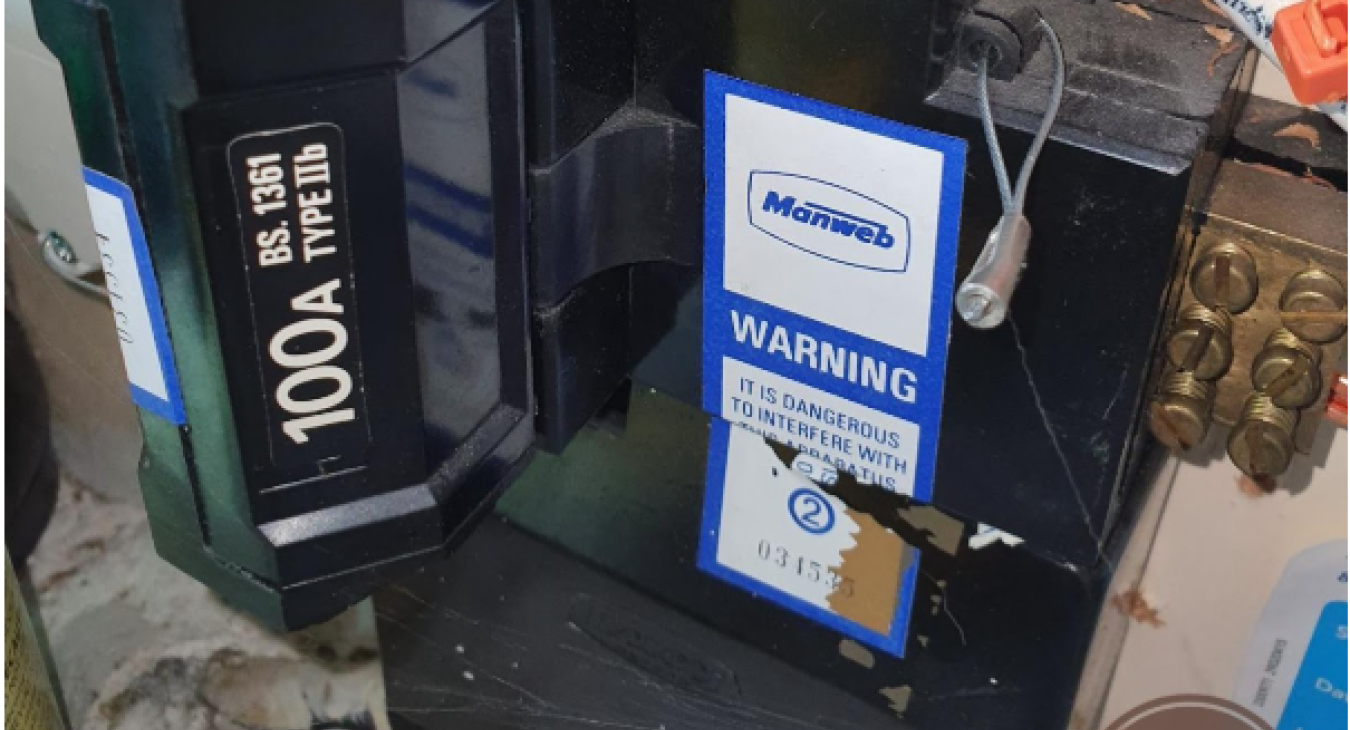Electrical systems need a way of protecting the wiring from overload and short circuit problems. They achieve this through the use of overcurrent protective devices like fuses and trip switches. In every electrical installation, there should be a main fuse – the final thing to blow in the event of a fault.
1) What Is a Main Fuse?
The main fuse is quite possibly the most important thing near to your home’s electrical panel or consumer unit. Located before your electricity meter and your consumer unit (also known as fuse boxes or the main fuse box), this critical component serves as the primary protection for your entire household electrical wiring system.
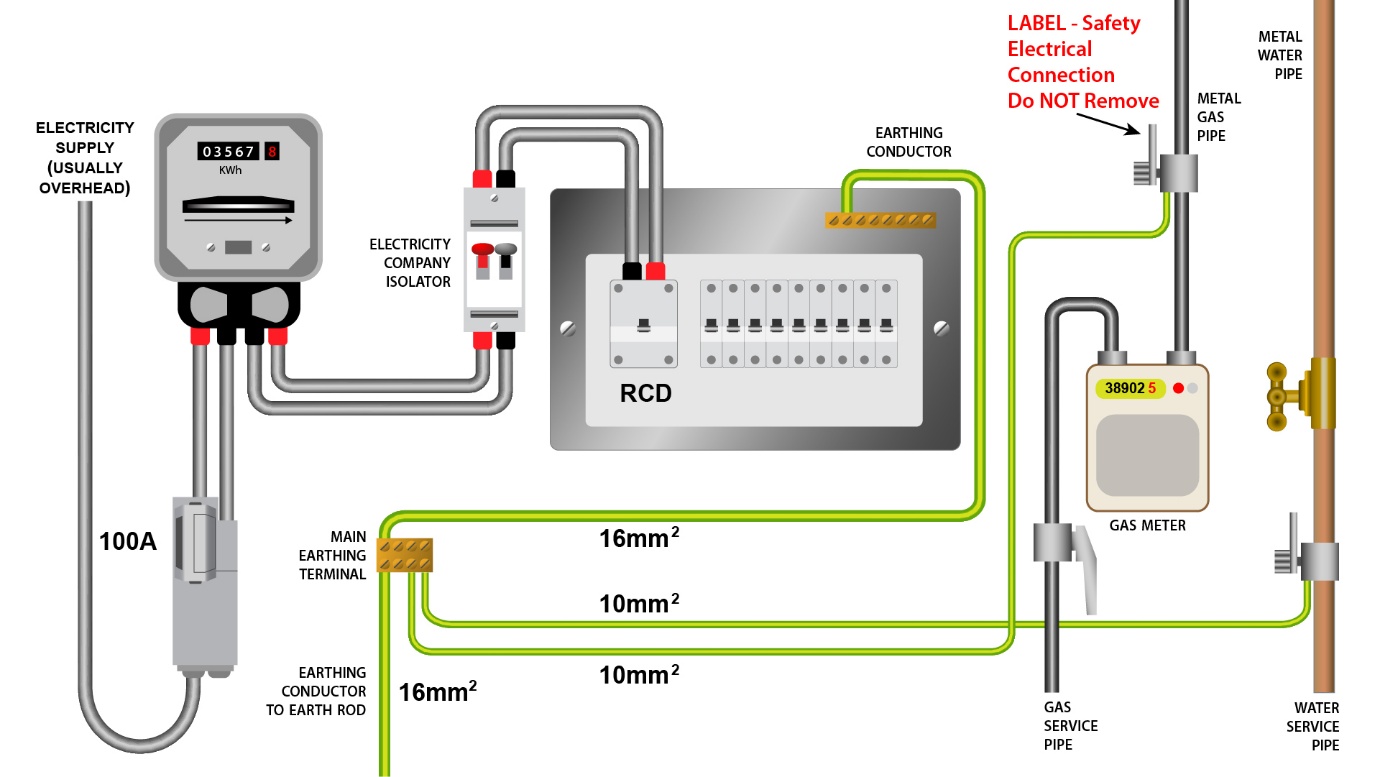
Unlike the smaller fuses or trip switches that protect individual circuits, the main fuse is designed to safeguard the incoming supply to your entire property. Depending on your home's age and the current regulations in your area, you might have a different type of fuse installed:
- Traditional ceramic fuses with fusible wire (Older Installations)
- Cartridge fuses housed in a dedicated fuse holder
- HRC (High Rupturing Capacity) fuses for enhanced protection
The main fuse is typically rated higher than individual circuit fuses, with common ratings being 60, 80, or 100 amp fuse configurations depending on the size of your property and electrical needs.
Back to top2) Why Do We Need a Main Fuse?
There are several reasons why we need a main fuse including:
1. Overload Protection
When your home draws more electrical current than your system is designed to handle (known as full load or Maximum Demand), the main fuse prevents dangerous overheating of your home's main power line and Main Switch. Without this protection, overloaded cables could heat to the point of starting fires.
2. Short Circuit Protection
If a short circuit occurs in your home, the resulting surge in electrical current could cause catastrophic damage. The main fuse interrupts this dangerous condition immediately.
3. System Isolation
In emergencies, the main fuse works alongside your main switch to provide a means of isolating your home from the electrical grid, allowing for safer maintenance or emergency response.
4. Infrastructure Protection
The main fuse also protects the utility company's infrastructure from problems that might originate in your home, preventing issues from affecting your neighbors or the wider electrical circuit network.
For many homeowners, little thought is given to a main fuse but placing additional loads on your electrical system may require the main fuse may need to be swapped. Where electric showers, car charging equipment or outbuildings are being added, the main fuse may need to be upgraded in order to accommodate the additional demand.
Back to top3) Why Do Main Fuses Blow?
A blown fuse at the main entry point of your home's electricity supply is never random—it's nearly always responding to a potentially dangerous condition. Here are the most common reasons why your main fuse might blow:
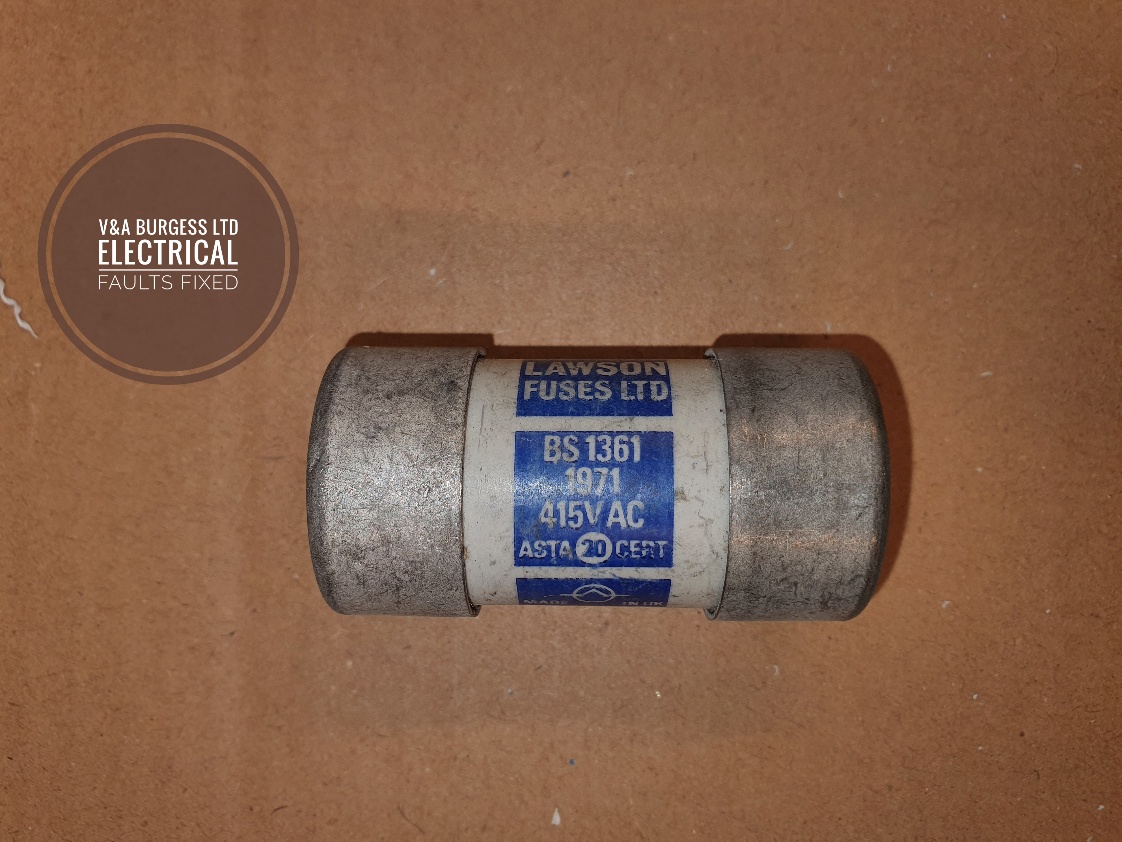
1. Total System Overload
Modern homes have increasing electrical demands. Between electric showers, immersion heaters, and multiple electrical appliances running simultaneously, it's possible to exceed your home's total amperage capacity. When the total draw exceeds what your main fuse is rated for, it will blow to protect your electrical loads and wiring.
Many homeowners report main fuse failures during cold winter months when multiple heating devices run concurrently, or during renovation projects when additional high-demand tools are being used.
2. Major Short Circuit
A significant short circuit anywhere in your home—where the Live (Line) (white wire (USA) in some systems) comes into direct contact with a neutral or earth conductor—can cause an immediate main fuse failure. This often happens due to damaged electrical wiring, worn insulation, or water ingress into electrical systems.
3. Ground Fault or Earth Fault
An earth fault or ground fault occurs when current leaks to earth through an unintended path. While modern installations typically have residual current devices (RCDs) or Ground Fault Circuit Interrupters (GFCIs)(USA) to catch these problems, in older properties with less sophisticated protection, a severe ground fault might trigger the main fuse to blow.
4. Lightning Strike or Electrical Surge
Though rare, a lightning strike or major surge from the utility company's lines can cause your main fuse to blow as it protects your home from the incoming power spikes. In modern UK electrical systems, we now fit Surge Protection to direct spikes in voltage back to earth and protect the wiring system in our properties.
5. Faulty Main Electrical Components
Problems with your consumer unit, fuse panel, or the main fuse block itself can sometimes lead to fuse failure. This might include loose connections, corroded contacts, or issues with the fuse holder. Poor Connections can create high resistances which lead to overheating and the melting of the fuse wire.
6. Automotive Electrical Issues
For those with electric vehicles or working on automotive electrical projects, problems with battery cable connections, starter battery issues, or incorrect use of starter cables can sometimes cause related fuses to blow.
Back to top4) How to Know When a Main Fuse Has Blown
The main fuse will not always fail with a large bang. In cases where prolonged overload has occurred on the electrical system, the main fuse will sometimes just quietly melt its wire and break the flow of current. In cases where a large surge of electrical current has occurred, you are likely to notice a loud pop or bang as the fuse wire explodes.
Below are some signs of a blown main fuse to look for:
1. Complete Power Loss
The most obvious indication is a total loss of power throughout your entire property without any switches tripped. Unlike a tripped circuit breaker or blown circuit fuse that affects only one area, a main fuse failure cuts power to everything—all lights, all plug sockets, and all circuits. We can see from the photograph below that no switches have tripped but there is no power!!!
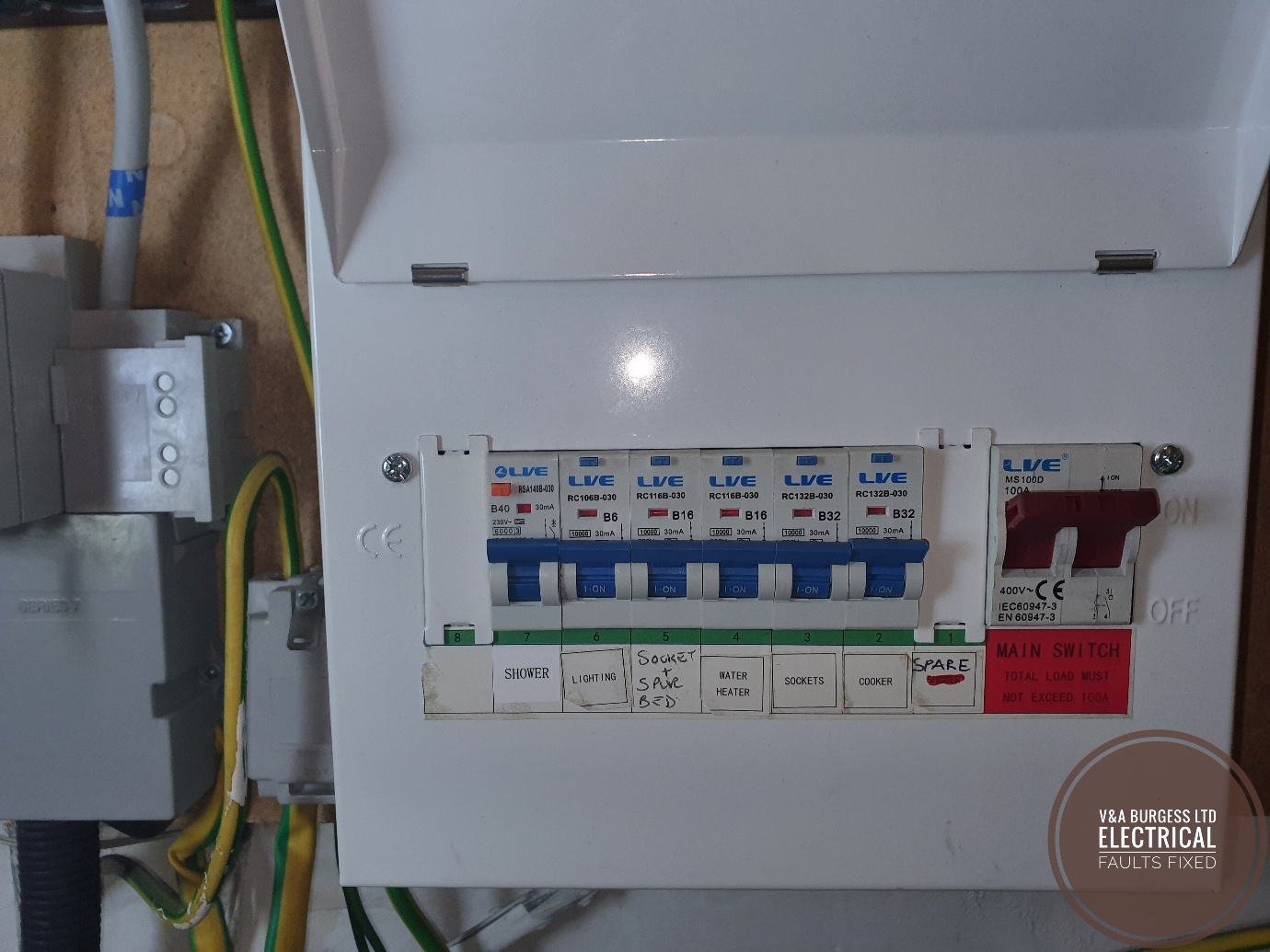
(Photo: Main fuse blown (LEFT) no switches tripped in consumer unit)
2. No Partial Power
If some circuits in your home have power while others don't, the issue is likely a tripped circuit breaker or individual circuit fuse rather than the main fuse. When the main fuse blows, nothing in your home will have power.
3. Visual Inspection
If safe to do so you might visually inspect the main fuse for signs of damage. A blown fuse may show:
- Discoloration or blackening
- A broken fusible link
- A damaged housing or fuse holder
- Visible melting or deformation
However, it's important to note that visual inspection of main service equipment should only be performed if you can do so safely, without removing covers or touching components. This equipment is generally owned by the local Distribution Network Operator and should not be interfered with.
4. Using a Test Light
Some experienced homeowners might use a test light or non-contact voltage indicator to verify the presence or absence of voltage, but this should only be used as a guide and is NOT the way to correctly perform safe isolation.
5. Circuit Testing
Electrical circuit testing in wiring systems is a job best left to an electrician. Your electrician will check for faulty wiring, short circuits and can estimate the total load of your electrical system to determine the reasons why the Main Fuse has blown.
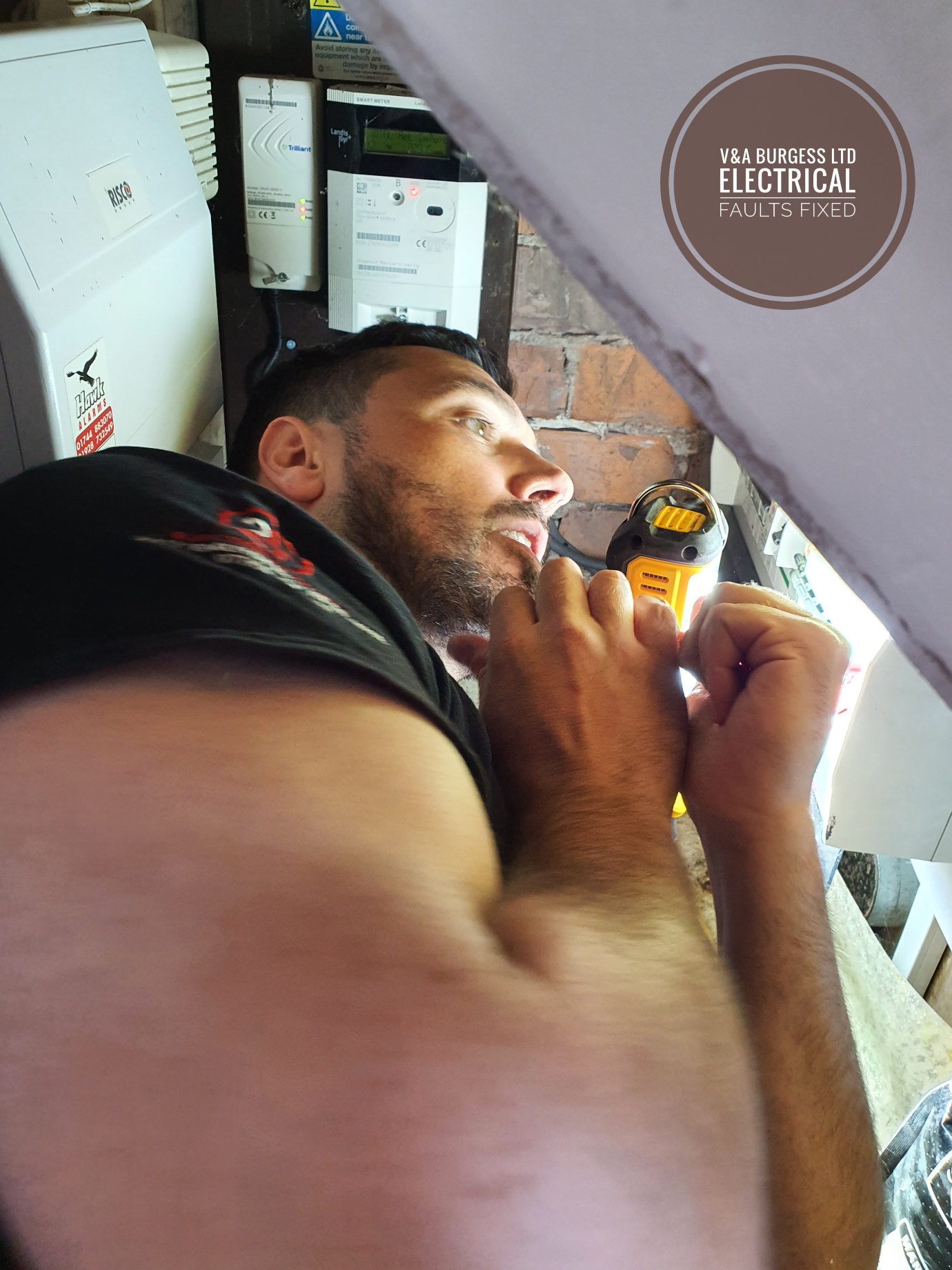
5) What to Do When the Main Fuse Blows
When your main fuse blows, it's signaling a potentially serious electrical problem. Here's what you should do:
1. Safety First
The most important thing is your safety. Don't attempt to replace or reset the main fuse if you're not qualified to do so. In most cases, the Main Fuse is NOT a serviceable part in your home and can ONLY be changed by the Electricity Network Operator so give your local DNO or electrical supplier a call.
2. Look for Obvious Causes
Before calling an electrician, consider what might have caused the overload:
- Were multiple high-demand appliances running simultaneously?
- Did the failure coincide with plugging in a new device or turning on a particular appliance?
- Has there been recent water ingress or visible damage to any electrical components?
3. Contact a Qualified Electrician
For main fuse issues, contacting a qualified electrician is almost always the right course of action. They have the training and equipment to:
- Safely replace the main fuse / Call the relevant authority
- Test your system for the underlying cause
- Ensure your fuse size is appropriate for your home's demand
- Check that your wiring systems comply with current regulations
- Inspect your electrical panel and consumer unit for other issues
4. Avoid Temporary Fixes
It might be tempting to try a quick fix, especially if you're facing a long wait for professional help, but remember that main fuse failures indicate serious safety issues. Temporary or amateur repairs can create fire hazards and potentially void home insurance coverage.
Back to top6) Upgrading Your Main Fuse Protection
If you've experienced repeated main fuse failures, it might be time to consider an upgrade to your home's electrical protection systems. Modern consumer unit installations often include:
- Your Electrician Contacting the relevant authority for main fuse upgrades
- RCBO protection for enhanced safety
- AFDD (Arc Fault Detection Devices) for additional fire prevention
- Surge protection devices
7) Conclusion
Your home's main fuse is an important safety component that deserves understanding and respect. When a main fuse blows, it's not merely an inconvenience—it's a safety system doing exactly what it was designed to do: protecting you and your property from potentially dangerous electrical conditions.
If you're experiencing main fuse issues or want to ensure your home's electrical protection is adequate, consulting with a qualified electrician is always the safest approach. They can assess your home's specific needs, recommend appropriate upgrades, and ensure that all work complies with current electrical safety standards.
For more information on common electrical problems and other electrical related queries, you can check our blog posts.
Remember, when it comes to your home's electrical safety, professional guidance provides not just solutions but invaluable peace of mind.
Read more articles
- Log in to post comments

